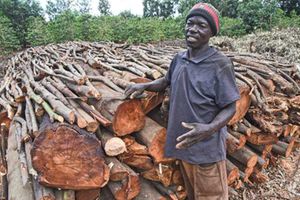Waste management and the circular economy

Garbage dumped in Nairobi River pictured on August 16, 2023.
What you need to know:
- Improper management of organic waste in landfills is a significant problem.
- The methane released during decomposition is over 25 times more effective at trapping atmospheric heat than carbon dioxide.
The issue of waste management and climate change has become a global concern, including in Kenya. The way we produce, dispose of and manage waste significantly contributes to greenhouse gas emissions, which are major drivers of climate change.
Improper management of organic waste in landfills is a significant problem. The methane released during decomposition is over 25 times more effective at trapping atmospheric heat than carbon dioxide. Additionally, the energy-intensive processes involved in manufacturing, transporting, and disposing of products contribute to carbon emissions, making global warming worse.
Kenya faces the challenge of waste mismanagement and climate change, which threaten our goal of achieving a green environment by 2030. We're already experiencing negative effects such as rising temperatures, changing rainfall patterns, and extreme weather events that impact agriculture, water resources and health.
In June, Environment and Climate Change PS Festus Ng'eno expressed regret over the country's approach on waste management, which denies us the opportunity for circularity and sustainable consumption. Nairobi County alone generates 2,400 tons of solid waste daily, of which only 45 per cent undergo any form of recovery or recycling process. A more significant percentage ends up burned or dumped, polluting the environment. Improper waste disposal clogs drainage systems, leading to flooding during heavy rains. This not only disrupts our lives but also increases the spread of diseases.
All hands on deck
To tackle the interconnected issues of waste and climate change, we need to adopt sustainable practices. The 3R principle - Reduce, Reuse and Recycle - can help us play a pivotal role in this endeavour. This means reducing our consumption, reusing items and recycling materials to significantly lower our carbon footprint. Simple steps like choosing reusable products, minimising single-use plastics and composting organic waste can make a big difference.
However, the responsibility doesn't rest solely on individuals. Corporations and industries must prioritise sustainability by adopting a circular economy approach. This approach focuses on designing products for longevity, easy repair and eventual recycling, reducing waste generation and conserving resources. Kenyan businesses can benefit from this model by implementing eco-friendly production methods and supporting recycling initiatives.
Policies are also crucial in promoting waste reduction and climate change mitigation. Kenya's policymakers can implement regulations that incentivise green technology adoption, support renewable energy sources, and promote responsible waste management. Public-private partnerships can facilitate the development of waste-to-energy projects, converting organic waste into biogas to generate electricity while mitigating methane emissions. By working together, we can make a positive impact on the environment and our future.
The government should foster the adoption of a circular economy by creating awareness and passing bills that address waste management. Greenlighting policies such as the Sustainable Waste Management Policy and Act of 2022 promote responsible behaviour by reducing waste generation and shifting to a circular economy. It includes provisions for Extended Producer Responsibility schemes that hold manufacturers accountable for financing waste management.
Reducing waste and adopting sustainable practices is crucial to protect the environment and public health. We need to hold corporations accountable and work towards a circular economy to reduce our carbon footprint. Collaboration is key to achieving a cleaner, healthier, and sustainable future for Kenya. Let's work together to make significant progress.




